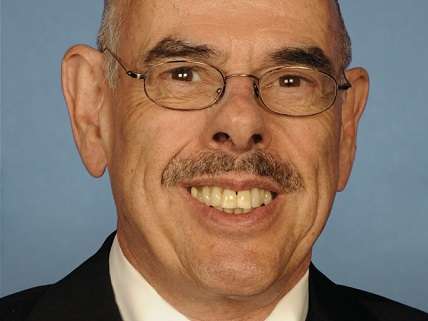Congress Talks GMO Labeling, Actually Makes Sense
The early results of this bipartisan effort, it may surprise you to learn, aren't half bad.

Recently, the FDA, courts, and voters in several states have had their say on a variety of food-labeling issues.
The FDA's menu-labeling rules dropped last month. Lawsuits on a variety of food-labeling issues continue to bubble. Examples include lawsuits over labels appearing on foods from mayonnaise to booty to skim milk.
Now Congress is having its say. And the early results of this bipartisan effort, it may surprise you to learn, aren't half bad.
The issue Congress chose to tackle, in a hearing this week, is that of mandatory GMO labeling. While several states are agitating for such labels—and Vermont voters even approved such a measure—there have also been calls for Congress and the FDA to implement some sort of mandatory federal labeling scheme.
Last week, for example, a group of celebrity chefs traveled to Washington to push Congress to label GMO foods. But that move may have backfired.
"In a press conference before the meeting, about half a dozen of the chefs admitted to reporters they do not have GMO labeling on their menus," reported Politico.
As if that news wasn't bad enough for the activist chefs, this week's hearing on Capitol Hill shows that Congress appears to have little stomach for either state or federal GMO labeling regulations.
"If the labeling could result in higher food costs, then maybe that's not a risk we want to take," said Rep. Frank Pallone (D-NJ).
"I'm concerned that mandatory [GMO] labeling could be inherently misleading," said Rep. Henry Waxman (D-CA) in an opening statement during Wednesday's energy and commerce committee's health subcommittee hearing.
Waxman said FDA-mandated GMO labels could serve to mislead consumers by implying GMO foods aren't as safe as conventional ones. FDA officials claim GMO foods are just as safe as any others.
The lack of fervor for more regulations surprised some. Waxman in particular, reports Politico, is one of "a handful of key lawmakers from the Democratic party with a reputation for being proactive on food regulation [and who] surprisingly expressed concern over the recent push for GMO labeling requirements."
The concerns of Democrats like Pallone and Waxman were echoed by their Republican colleagues.
"Food labeling is a matter of interstate commerce, and is therefore clearly a federal issue that rightfully resides with Congress and the FDA," said subcommittee Chairman Joseph R. Pitts (R-PA) in his opening remarks. "I am concerned that a patchwork of fifty separate state labeling schemes would be impractical and unworkable."
Opposition in Congress both to a federal labeling scheme and to state efforts to demonize GMO foods has helped give rise to a bipartisan bill that would crack down on the latter.
Rep. Mike Pompeo (R-KS) is pushing the Safe and Accurate Food Labeling Act. The bill, co-sponsored by Rep. G. K. Butterfield (D-NC), would preempt state labeling laws like that in Vermont and, Pompeo says, "protect consumers by eliminating confusion and advancing food safety."
Effectively, the sensible bill would tell states and cities that they cannot do what the Constitution forbids them already from doing: require, for example, local approval for labels of foods moving in interstate commerce. The bill would reserve for producers the option to label foods that do or do not contain GMO ingredients.
One group supporting the Pompeo/Butterfield bill is the Grocery Manufacturers Association. In a GMA press release earlier this year, one partner called the bill "an important first step to restoring sanity to America's food labeling laws."
GMA should know about such steps. They filed suit in federal court earlier this year challenging Vermont's unconstitutional GMO-labeling law, which mandates that the label of a food product containing genetically engineered ingredients must display an affirmative declaration of the presence of such ingredients if the product is to be sold in the state. That suit is ongoing. Meanwhile, a separate lawsuit filed this week by supporters of an Oregon ballot initiative that would have mandated GMO labeling in the state—which lost at the ballot box—has already been rescinded.
Efforts to force labeling in Vermont, Oregon, and many other states is clear evidence of the need for action. I'd prefer the Supreme Court weigh in on the Vermont lawsuit and side with GMA, effectively settling the issue. The next-best thing would be for Congress to act. If this week is any indication, Congress might beat the high court to the punch.


Show Comments (76)